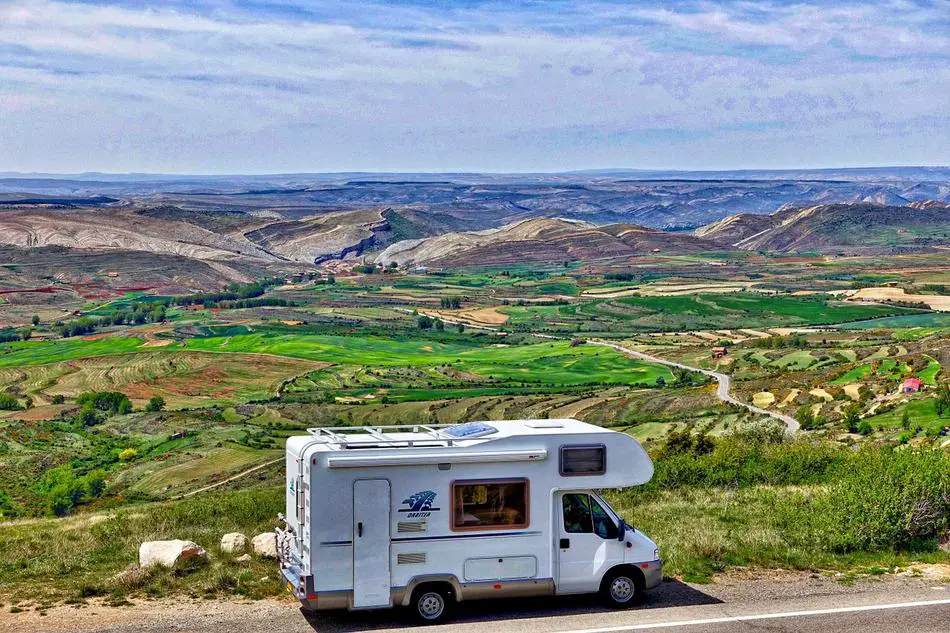If you’ve reached this article, then you are just like me, looking for the full and exact answer on self-contained RVs. Before deciding on buying a recreational vehicle (RV), I’ve done some extensive research, asking both basic and advanced question. Here is what I’ve found out, hopefully it helps you as well.
So first of all, what is a self-contained RV? Basically, self-contained RVs have all the essential additions that makes you independent of whatever the campsite offers. Usually it contains a generator, sewer tanks and running water. Most of the American RVs are self-contained, and they make your trip much easier and more enjoyable.
Most – but not all of them. A class B motorhome is not always self-contained. But I am getting ahead of myself. There are many RV-related questions that must be answered in depth, before you make your choice of purchase or rental. For instance, what’s the level of self-containment that any RV can have? How long can you use it for, without requiring any electric hookups or outside utilities? What exactly are the different motorhome classes, and which one is the best for you? What driver’s license do you need for an RV? And so on.
Let’s try answering these and other questions, shall we?
Self-Contained RV – Definition and Classes
You could be on the road for a holiday or vacation, or you could be living off the grid. Either way, a motorhome or campervan has always been America’s favorite choice of such a travel. You drive and live in an RV without fully relying on any external resources. A good RV, as I just mentioned, has a toilet as well as a container for graywater from the shower and the sink and for septic waste. Which means you can just park for the night without searching for public restrooms. And then you’re simply gone in the morning, driving off with all the essential facilities within the RV.
There are several RV variations available, but basically there are two main types – towable and motorized. The motorized ones are the main subject of this post, they are usually self-contained, and one can drive and live in them. I have a prepared a table of three major motorized RV classes for your convenience:
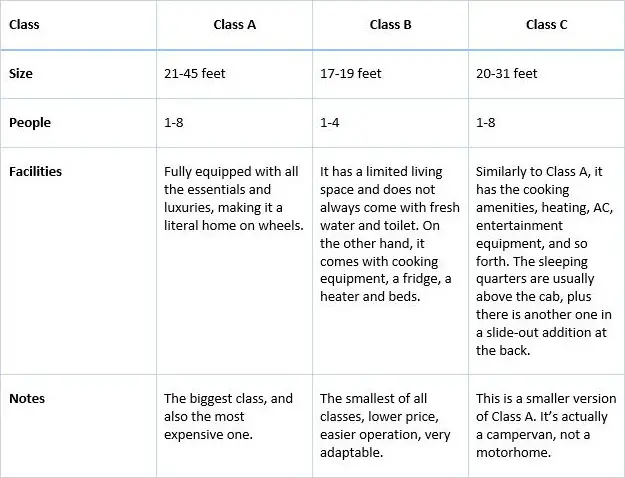
With this table in mind, ask yourself these three crucial questions before deciding on the best RV class for you:
- How many people will be traveling in the RV – therefore, how many beds it should have?
- What is your travelling plan? Will you be staying at the same spot for several days, or do you plan to move a lot and visit many different landmarks?
- How much money do you intend to spend? Your budget should include such expenses as gas and insurance.
If you can answer these, then choosing an RV class becomes an easier task. I will add more information below that can help you to come up with a definite answer. Let’s proceed and understand even further what it means to have an RV.
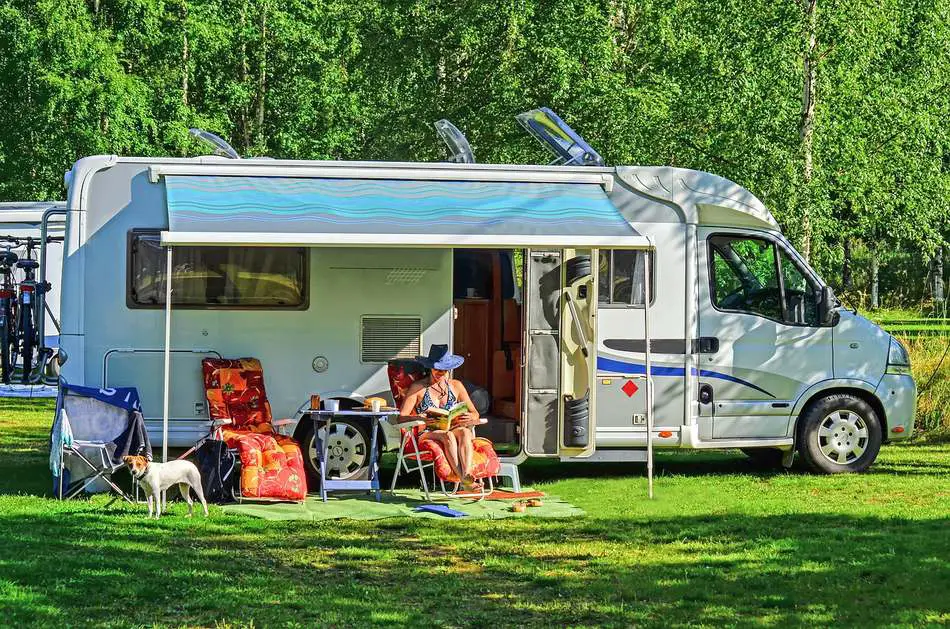
Why a Self-Contained RV Is the Best Choice for You
Again, a self-contained RV is something that you can use and drive without needing any external sources. When you camp it, you don’t need to worry whether or not the site has any hookups. This is what we call a “boondocking” or “dry camping”: you park anywhere without hooking your RV to the local power grid, water grid or sewage. You have everything that you need in the RV, and that is where it all stays as well. This is an essential part of full time RV living.
For the perfect boondocking experience, your RV must be equipped with the following systems:
- A big water tank for all your washing and showering.
- Big gray water and black water tanks that contain your used water and waste.
- A complete electrical system, powered by either a generator or by big batteries.
What to do if you don’t have these? Well, then you’re not self-contained and can’t dry camp. You would need to find a campsite with a power grid you can connect to, as well as a hookup for water and an access to the sewage, to dump the waste. Furthermore, the campsite would need to have showers and public WC. Good luck stumbling there in the dark and using the same space used by hundreds before you.
Please notice that you would need, from time to time, to find a campsite or any other locations that has a dumping station. This is where you get rid of the accumulated waste and gray water. Never dump these anywhere else, the last thing we want is a negative environmental impact! This is another reason why a non-contained RV is inferior to a self-contained one – it has no means of containing the waste, which is often dumped in the most inappropriate places.
Here is a video of a good example of what a self-contained RV is:
More on RV’s Water and Sewage
Speaking of water hookups and dumping stations: how long until you will need these? Well, the deciding factors are the frequency of your bathroom and water usage, as well as your tanks’ volume.
Usually, a typical self-contained vehicle can contain 3 days of waste until you’ll need to stop by a dumping station. As I said earlier, you can find these near most of the campgrounds. Searching online for one is always a good strategy.
If you wish to remain off the grid for a much longer period of time, consider investing in much bigger tanks. Try saving water as you do so, and enjoy your stay away from the hookups and dumping stations.
One of Amazon’s most recommended tanks is A.A 30 Gallon RV Fresh/Gray Water Tank. 30 gallons is an impressive volume that should answer all your needs. The tank is very durable and reliable, its seamless design leaves no room for leaks. Its high quality polyethylene material is approved by the FDA. The tank can be easily installed on any RV.
The RV’s Electric Setup – Batteries and Generator
And what about the electricity, how long will it take before you’ll need an electric hookup? First of all, your RV has batteries, but these can be somewhat limited. Any large appliances that you might have, including your AC system – the batteries won’t be able to power them.
Therefore, you will also need a fuel-powered generator. The generator will influence how long you can travel without needing an electric hookup. There are many models of generators available for purchase. The portable ones can run between 8 to 20 hours. A built-in generator can operate even longer, for days, providing that you look after it.
You can also go green and self-efficient, and opt for a complete solar panel system for RV, such as the highly recommended ECO-WORTHY 200 Watt Monocrystalline Solar Panel Kit on Amazon. It has 2 100W solar panels, 20A controller and solar cables that connect this setup to your battery. So now you can charge your RV battery while being completely eco-friendly. The panels are guaranteed to produce energy for at least 25 years! The charge controller comes with an LCD display and protects your system from short circuits and overloads. You can install the whole kit under an hour and immediately start enjoying reliable and clean power.
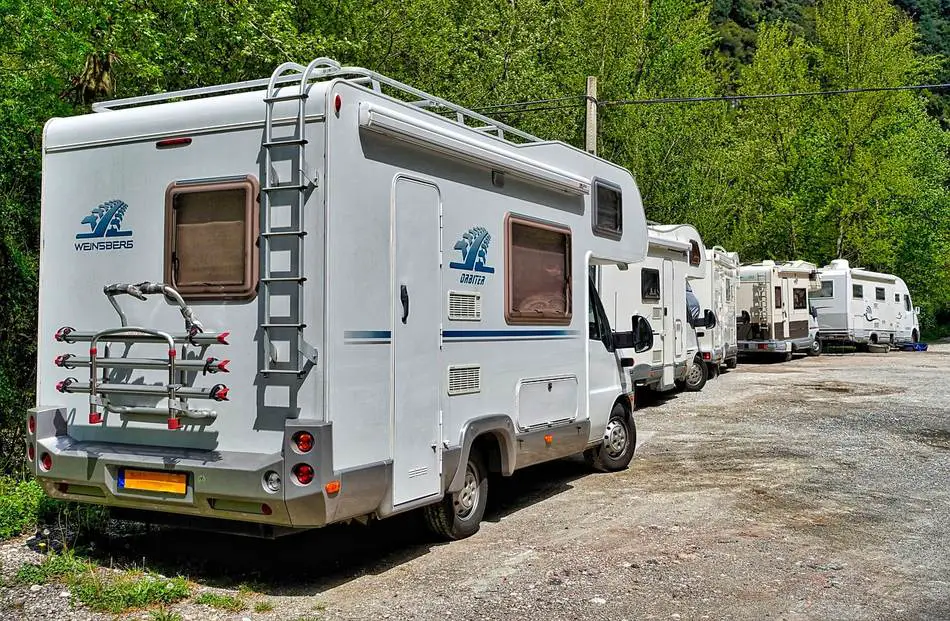
Types of Campsites
Campsites can be free or paid. There are two major distinctions between paid campsites that are relevant to any RVer. There is a powered camping site and a non-powered one. The powered campsites have all the hookups, you can get all the electricity that you need and plug appliances and electronics in. These sites cost more than their non-powered counterparts, so you can add that as another expense to cover, if your RV is not self-contained.
So if you’re driving a self-contained vehicle, its own power grid allows you to park at the non-powered locations and save a buck or two. Yes, you don’t have to park in the middle of nowhere, you can boondock on a camping site, not too far from the urban area. Or even choose a free spot inside a city – see the options below.
Best Free Parking Spaces for an RV
There are free camping areas, which can be ideal for a self-contained RV. The so called “freedom camping” can be anything from a simple dirt lot to fully equipped, albeit rare, camping sites with all the luxuries. Freedom camping has various conditions and laws, and they are not the same in every country or state, so you better research them online well ahead. Nonetheless, some of us use the freedom parking to live off the grid in an RV.
Personally, I’d recommend use both freedom camping and the paid one. You’d need a paid campsite about once in 3 days to charge the batteries and dump the waste and gray water tanks.
If you’re searching for free camping spaces for your RV, I’d look for these in your vicinity:
- Rest areas: you can park there for free, but make sure you know the local laws, as it might not be legal in some states. Truck drivers also use these to park for the night, so check for available space in advance.
- Walmart: these stores usually have enormous parking lots, where you can stay for the night for free. But the policy may vary from store to store, so check with the manager first. You can also look online for a feedback from other RV enthusiasts who parked there.
- Truck stops: they have parking areas allotted specifically for recreational vehicles. Check ahead if they are free, because it’s not always the case. Again, search online for reviews of a stop you’re interested in, it may not always be very hospitable.
- Repair shops: this one is a twofer, as you can fix something that you planned to fix for a while, and also spend the night. Usually a car repair shop wouldn’t mind to have you as the last customer in the afternoon, or a very first customer in the morning, and you can stay before or after the fixing is done.
- Churches, temples and other holy places: they mostly have large parking spaces, although these can fill according to whatever day is celebrated the most. For instance, a church’s parking area will be full on every Sunday.
- Casinos: a large volume of American and Canadian casinos encourage to park nearby, to attract customers and players. If you have ever been to Vegas, you’d notice that the parking spaces resemble actual campsites, with all the RVs parked nearby. There are no hookups, and the lots are crowded on holidays and weekends, but you’ll probably find a space to fit in.
- Schools: you will need a permission to park next to a school. They usually have wide parking spaces for the local community. Their advantage is that nobody uses them on weekends. Just make sure you’ll be gone very early in the morning, before the school starts.
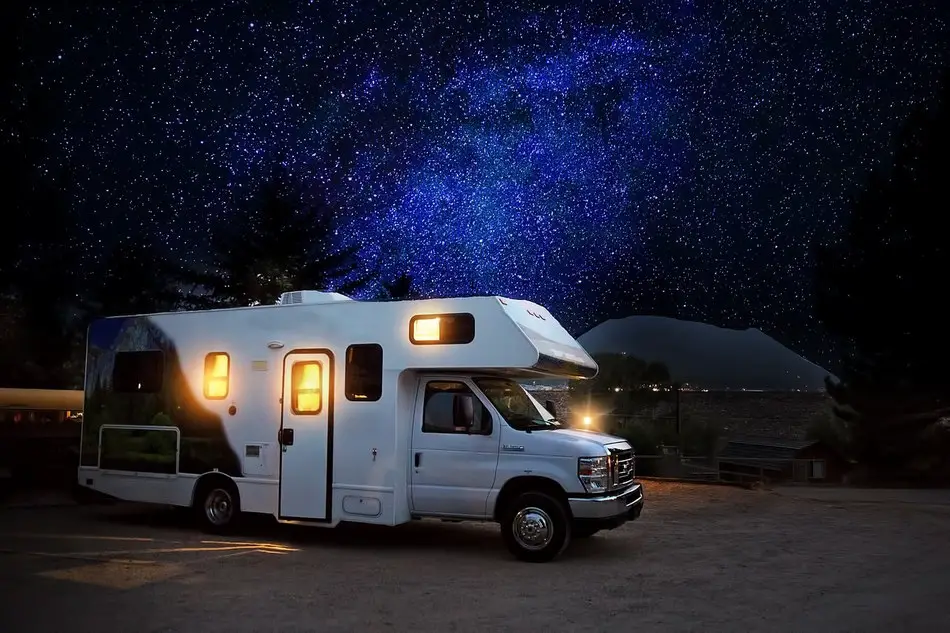
Let’s Talk About RV Prices
Campervans and motorhomes have a distinctive gap in rental price, which you will see right away. It’s less costly to rent a minivan that was converted into an RV than a luxury unit that can fit several people. However, even if the rentals prices for the self-contained RVs are somewhat higher, you save tons of money along the way. As I explained above, you can use free campsites instead of paying for hookups and campsite utilities. Think about the long run, of all the time and money saved by a self-contained unit, and you will see how the price gap narrows in your favor.
If you intend to buy a self-contained RV, the price range is amazingly wide. You can get a used trailer (whose condition is still good) for as low as $15,000. On the other hand, you have luxury units and 5th wheels, whose price can go up and above $100,000. These are also the costs of living completely off the grid.
This is where you have to decide how much you want in your RV versus how much you can spend. The most basic self-contained unit should have a toilet with a water supply and waste tank. This setup will, of course, cost the least. Should you desire more amenities and luxuries, the prices will naturally rise. However, you will create a feeling of a real home. If you intend to travel a lot, especially with a family, adding more features is well worth the price bump.
So seriously consider creating a true home feeling in your vehicle. There are excellent and fully equipped RVs available that contain complete kitchen, several areas for different purposes (lounge, dining area, bedrooms) and of course a personal shower. They also have all the top notch appliances, such as fridges, water heaters, microwaves, ovens and even awnings, among many others.
There is one expense that you cannot avoid, and we all have to be aware of it when we allocate a budget for an RV. The gas mileage. You will need more gas for an RV, and the prices in North America tend to rise during the summer. Of course there are efficient ways to deal with it. Research and the plan your journey through the gas stations with the lowest prices. They are usually situated along the smaller roads, while those along the highways are usually the ones with the highest gas prices.
You can, of course, somewhat reduce your gas consumption and cut down the costs. For instance, main a good tire pressure, make sure your rubber is in top condition. Drive steadily, as sudden accelerations spend more gas. Also consider packing less and remove unnecessary weight. A lighter RV needs less fuel. Routinely check your engine to ensure that it functions efficiently. Periodically visit a mechanic to replace oil, air filters and anything else that can improve the mileage. These and similar strategies can reduce your expenses, so that you can enjoy your travel without worrying too much about the costs.
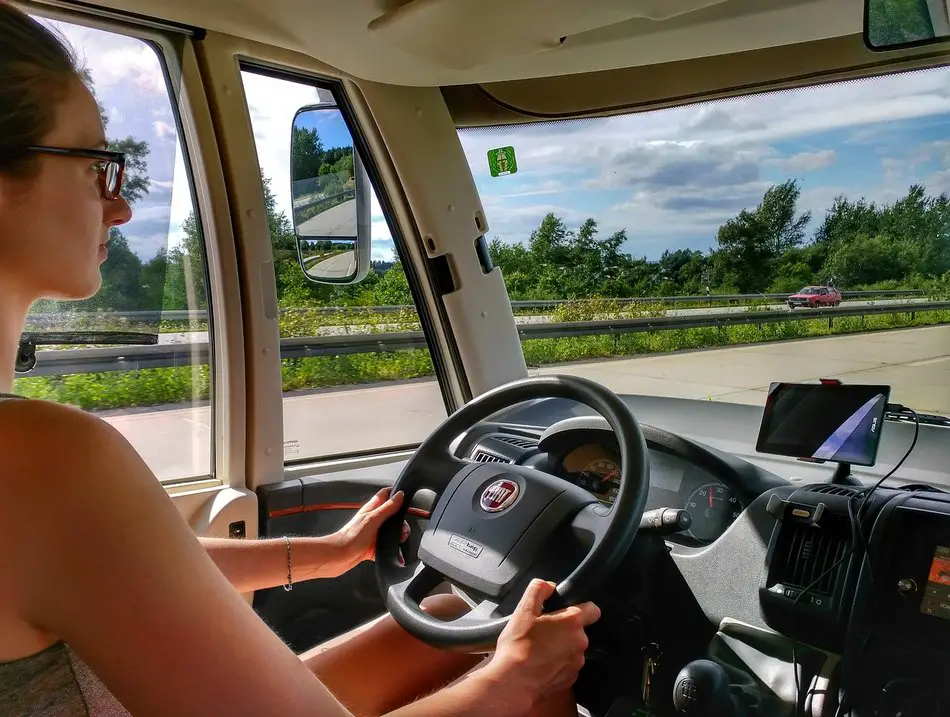
What Driver’s License Do You Need to Drive an RV?
The quick answer is that most of the RV classes require just a regular license to drive. However, several US states demand a separate license issued specifically for driving a large RV. The rules are different for various states. Here are some examples:
- Wisconsin: if you have a commercial driver’s license, be aware that its manual says that you can drive a five-wheeled motorhome, as long as it does not exceed 45 ft. in length.
- Hawaii: if your motorized home is somewhere between 15,000 lb. and 26,000 lb., you need a class 4 license. Anything heavier than that requires a commercial driver’s license.
- Connecticut: here they have a unique variation for trailers over 10,000 lb., called a class 2 license.
So as you can see, always check ahead if you have the appropriate license for the RV of your choice.
Please notice that a motorhome can be a challenging vehicle. Driving a large house of wheels with all the amenities requires some skilled maneuvering. Not only will you be driving unfamiliar roads, you will also need sometimes to make your way through a city in this large vehicle. Parking an RV also demands some experience. Perhaps take your new motorhome for a short journey at first, just to get a feel of it.
Final Words: Should You Get the Self-Contained Option?
Naturally, it’s up to you. The self-contained RV is extremely convenient, since you don’t need to trouble yourself with a daily search for a campsite and water closet. On the other hand, consider the costs and the size of the vehicle. Perhaps you’ll be fine with a more basic setup, if you’re an adventurous guy or gal. And then again, if you’re travelling with your entire family, then a small RV is never a possibility for you.
There is also another option, available especially in the US – having a small RV with a bathroom. This is probably the most looked after addition to the recreational vehicle that people desire, since you never know when nature will call.
All in all, having an RV is an excellent choice, even if you’re living off the grid in a city or town. Hopefully, this article was able to assist you with your decision. And whatever you choose, the most important thing is to enjoy your journey. Stay safe out there!

